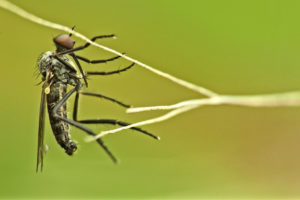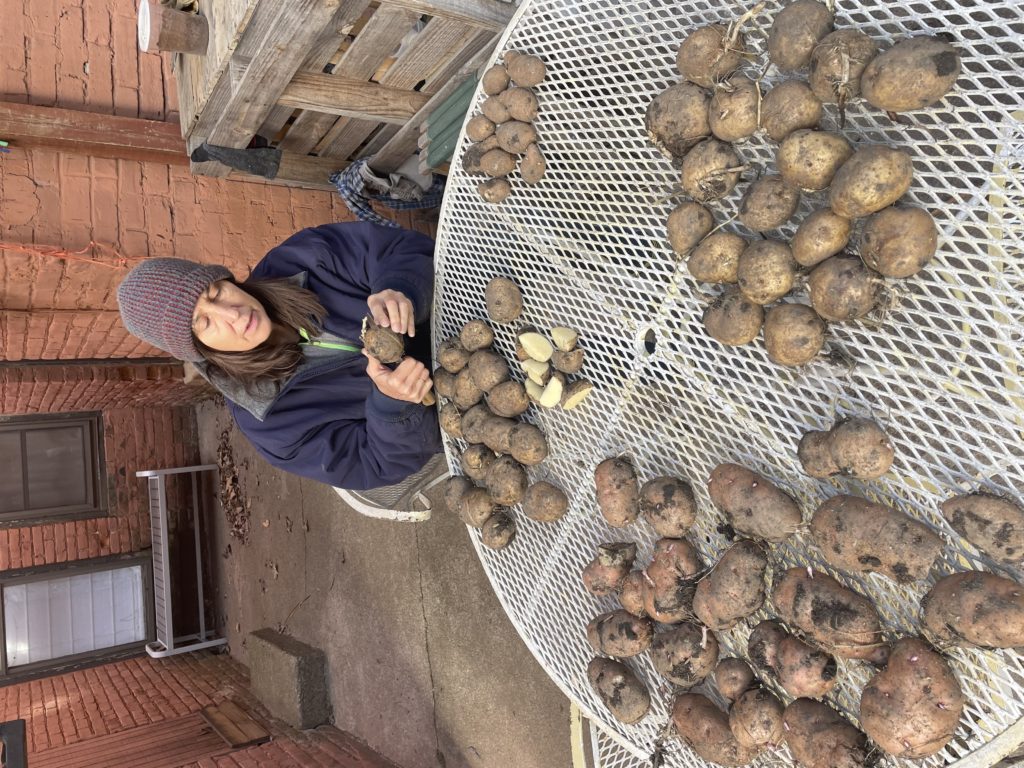Dear Friends,
WHAT’S ON TAP IN THIS WEEK’S PODCAST
SKEETERS (2-minute mark). Here in the upper Midwest, they’ll be out soon — or will they? Where I live in Des Moines, we’ve seen very few mosquitoes these past few years. While that makes for a more pleasant evening cookout, it’s also a matter of concern, given the alarming decline in insect populations globally. Scientists warn of a catastrophic domino effect if the trend continues.

“Mosquito” by RamónP is marked with CC BY 2.0.
Nonetheless, my city, Des Moines, continues to spray UNIVAR’S Kontrol 4 – 4 (Permethrin and Piperonyl Butoxide) multiple times each year.
If those chemical names sound nasty, it’s because they are. UNIVAR’S website says this about Kontrol 4 – 4: “Harmful if swallowed, inhaled or absorbed through the skin. Causes moderate eye irritation. May cause moderate skin irritation with prolonged or repeated contact. May cause allergic skin reactions. Toxic to aquatic organisms, including fish and aquatic invertebrates. Toxic to bees exposed to direct treatment on blooming crops or weeds.”
Fortunately, some communities allow residents to opt out of being sprayed. In Des Moines, you can register your address on a “spray shut-off list.” An additional exemption is provided for those who keep bees. If you’re a Des Moines resident and don’t want to get sprayed, call 515-248-6099.
Check with your city and/or county officials to find out if they provide an opt-out to spraying. Better yet, encourage them to pursue other options. To be clear, we SHOULD take action to control mosquito populations when they pose a genuine threat in residential areas. We can do that by removing standing water, putting up bat or purple martin houses, covering exposed skin, and applying eco-friendly bug spray.
URANIUM (25-minute mark). There’s one active uranium mill in the US, and it’s located next to the Ute Mountain Ute Tribe where it poses a major threat to the community’s health, water, land, and heritage sites. I recently learned of the problem from a friend who gave me the November, 2021 issue of High Country News. As is typical with incidents of environmental injustice, public officials have been mostly unresponsive to concerns raised by the Ute people.
The problem may soon get worse, as the company who owns the mill, Energy Fuels Resources, wants permission to import radioactive waste from Estonia.
Who is Energy Fuels Resources? A few years back, it was reported that company officials urged then-President Trump to turn over parts of Bear Ears National Monument to allow for greater access to other uranium deposits. Yup. Great corporate citizen.
Poor, marginalized, and politically powerless communities are increasingly targeted for industrial ventures that harm our planet and those in the direct path of such ventures. Historically, some of the worst acts of environmental injustice have impacted minority communities. That’s changing, as rural Iowa landowners battling three proposed CO2 pipelines can attest.
The bottom line is, since the greed and avarice of corporate oligarchs knows no boundaries, more and more of us have to fight to protect our land, water, planet, and the health and survival of our families and communities. We need to stand together. If we let them divide us, we lose.
MY WINTER IN NOVA SCOTIA (36-minute mark). In my early twenties, I spent a winter in the wilds of Cape Breton Island, Nova Scotia, living alone in a house on the edge of the highlands with no bathroom, running water, or electricity. My lone heat source was a wood stove. A giant sled dog and psychotic horse were my primary companions. Everything about the experience was fantastic — until someone burned down the outhouse.

Kathy quartering seed potatoes. Clockwise from noon: Dakota Pearl, Kennebec, Yukon Gold, and Red Pontiac.
FARM & FOOD: CHALLENGES OF A COLD, WINDY SPRING (54-minute mark). Kathy and I talk about what a difficult spring it’s been as we struggle to keep plants alive and prep our 60 garden beds. Besides the cold and wind, we’ve been plagued by, of all creatures, sparrows.
But things are looking up. As I’ve done every year for the past 35 years, today, Good Friday, Kathy and I are planting potatoes. Last fall, we saved the biggest spuds and buried them below the frost line. Today, we dug them, quartered them, and have prepared the four beds for planting. One of the most joyful moments of growing one’s own food is when the first green potato shoots push through the ground. That’ll be later than usual this year, but fingers crossed, it’ll all work out.
Thanks for reading, listening, and doing what you can to make our world a better place.
Ed
*******
(02:00) Stop spraying mosquitoes;
(25:00) Uranium mill near Ute community a classic case of environmental injustice;
(36:00) Lessons from a Nova Scotia winter;
(54:00) Late spring presents new farm and food challenges, with Kathy Byrnes.
– KHOI 89.1 FM (Ames, Iowa)
– KICI.LP 105.3 FM (Iowa City, Iowa)
– WHIV 102.3 FM (New Orleans, Louisiana)
– KPIP-LP, 94.7 FM (Fayette, Missouri)
– KCEI 90.1 FM (Taos, New Mexico)
– KRFP 90.3 FM (Moscow, Idaho)
– WGRN 94.1 FM (Columbus, Ohio)
Please support the local businesses and non-profits who make this program possible. Click on their logos on the Fallon Forum website and in our weekly email, and visit Dr. Drake Family Psychiatry, Story County Veterinary Clinic, Bold Iowa, and Birds & Bees Urban Farm. Thanks for supporting the civil alternative to the shock jocks!

Ed Fallon
